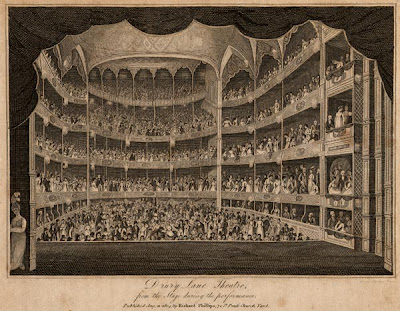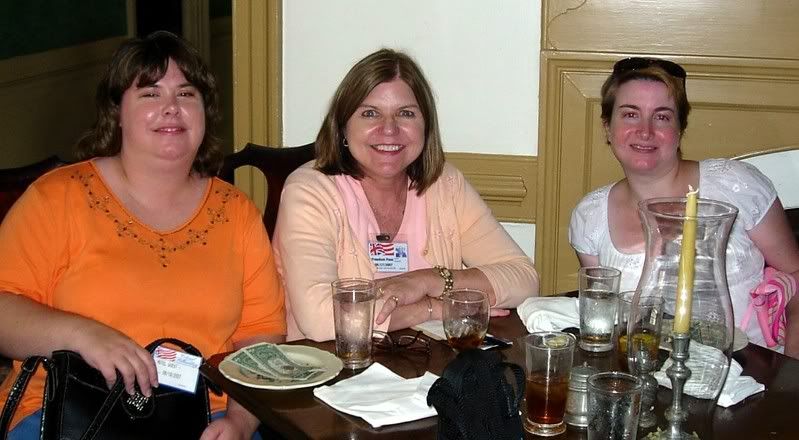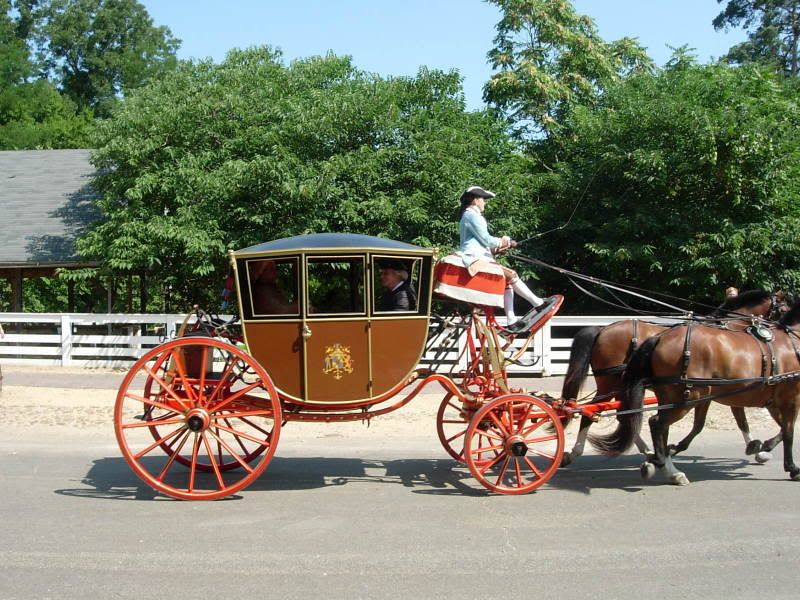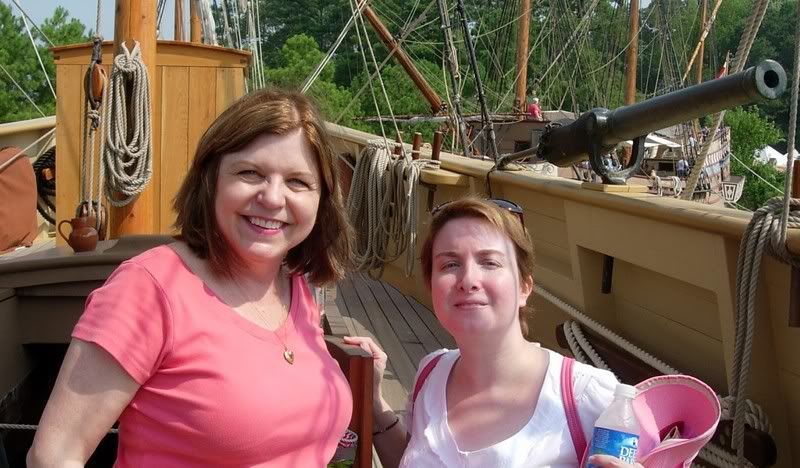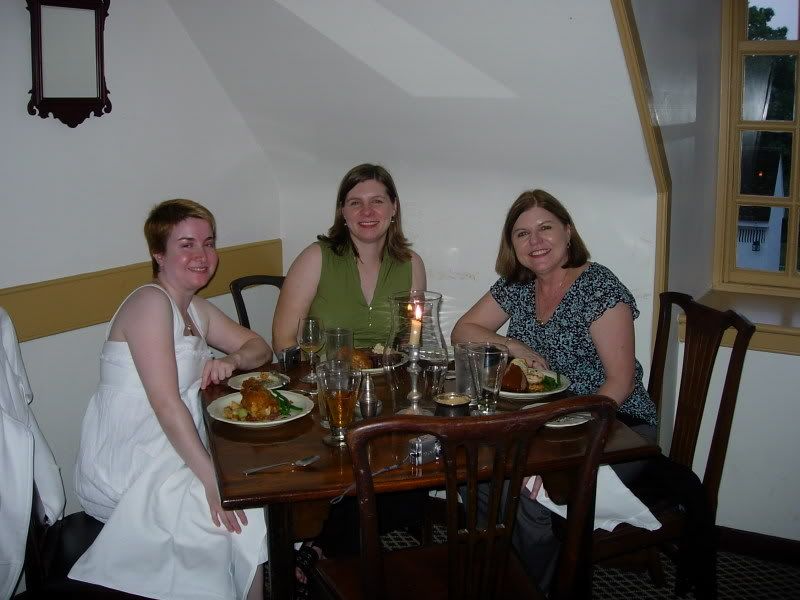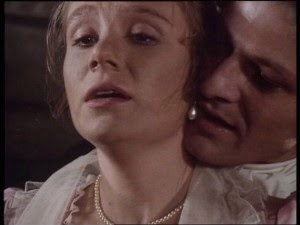First of all, happy anniversary to my parents! They celebrated their 36th yesterday (that is them at their high school prom–I kind of wish my mom still had that dress, it looks so “Regency”!).
So, I am back at work this week, yet wishing I was still on vacation! Especially a great vacation that involves costumed guides and pretty carriages, apple cider, and fun writing friends. I had a wonderful time visiting Risky Diane, Deb Marlowe, and Michelle Willingham (both of them will be visiting RR very soon!). Williamsburg was a blast, as was Jamestown Settlement (where we got to tour the ships and wander their huge new museum–not to mention their huge new gift shop) and Jamestown Island.  Seeing that place, so marshy and tiny, just emphasized the fact that, in many ways, those first settlers were a bunch of nincompoops (though, after seeing the movie The New World, nincompoops who look a lot like Colin Farrell and Christian Bale!). But I can’t help admiring that vast spirit of adventure and curiosity (and greed) that would make a person pack themselves into an itsy little wooden ship and launch themselves into the Atlantic, heading out for a new, strange place using a compass and some string to find their way.
Seeing that place, so marshy and tiny, just emphasized the fact that, in many ways, those first settlers were a bunch of nincompoops (though, after seeing the movie The New World, nincompoops who look a lot like Colin Farrell and Christian Bale!). But I can’t help admiring that vast spirit of adventure and curiosity (and greed) that would make a person pack themselves into an itsy little wooden ship and launch themselves into the Atlantic, heading out for a new, strange place using a compass and some string to find their way.
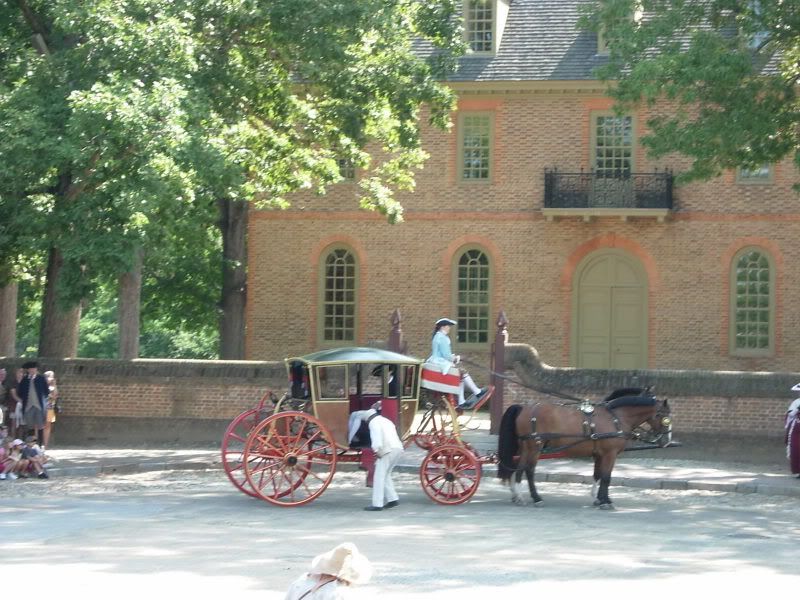 In Williamsburg, they were featuring a reenactment program called “Revolutionary City,” depicting the fall of the royal government. I was hoping for some riots, maybe a bonfire or two, but it seemed to be mostly the royal governor riding around town in his fancy carriage (which we couldn’t ride in!) giving speeches. Great clothes, though. And I bought a hat to go with my costume for next year’s Beau Monde soiree at RWA (it pays to think ahead!).
In Williamsburg, they were featuring a reenactment program called “Revolutionary City,” depicting the fall of the royal government. I was hoping for some riots, maybe a bonfire or two, but it seemed to be mostly the royal governor riding around town in his fancy carriage (which we couldn’t ride in!) giving speeches. Great clothes, though. And I bought a hat to go with my costume for next year’s Beau Monde soiree at RWA (it pays to think ahead!).
 Then I had to go home. But first, more fun! Thanks to the hurricance, air traffic was backed up, and I got to sit on the plane for over two hours before we took off. For a fearful flyer, this is not good. Too much time to worry. I distracted myself with one of the many books I bought in Virginia–Alan Haynes’ Sex in Elizabethan England. This was a fun book, not very long but full of all the scandal highlights of the late 16th century. The writing style made me wonder if it was a rather rambling university lecture transcribed into a book, as it had several asides with no info at all to explain them (like “not long after that lamentable fracas at Mrs. Bull’s…”, which, if you didn’t already know Christopher Marlowe was killed at Mrs. Bull’s lodging house in that year, would be meaningless. They could have at least had some footnotes). Then I read Vogue.
Then I had to go home. But first, more fun! Thanks to the hurricance, air traffic was backed up, and I got to sit on the plane for over two hours before we took off. For a fearful flyer, this is not good. Too much time to worry. I distracted myself with one of the many books I bought in Virginia–Alan Haynes’ Sex in Elizabethan England. This was a fun book, not very long but full of all the scandal highlights of the late 16th century. The writing style made me wonder if it was a rather rambling university lecture transcribed into a book, as it had several asides with no info at all to explain them (like “not long after that lamentable fracas at Mrs. Bull’s…”, which, if you didn’t already know Christopher Marlowe was killed at Mrs. Bull’s lodging house in that year, would be meaningless. They could have at least had some footnotes). Then I read Vogue.
I’m sure you’ll be hearing lots more about my book purchases in the next few weeks, as I work my way through them! And more of the historical tidbits we gleaned from the tours (ask Diane about printing presses!!).
What would your ideal vacation be like?
(And don’t forget to join us this weekend for Christine Wells’s interview! Her debut book from Berkley, Scandal’s Daughter, is out next month…)




